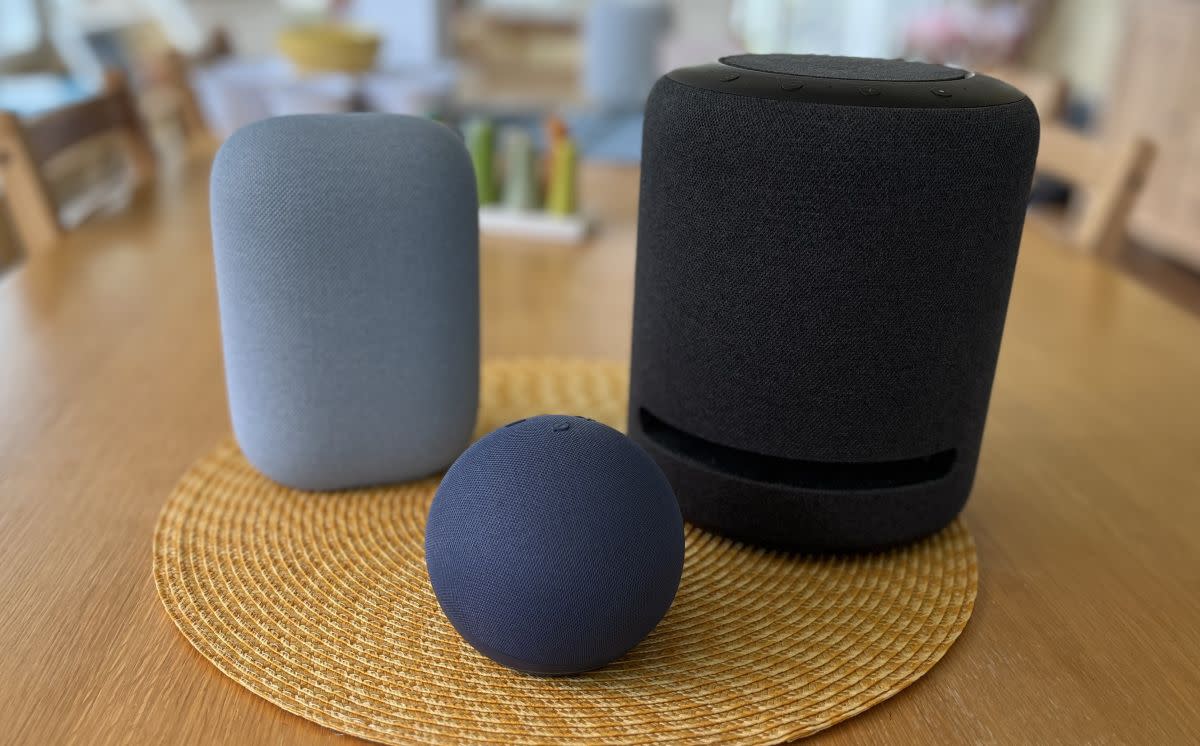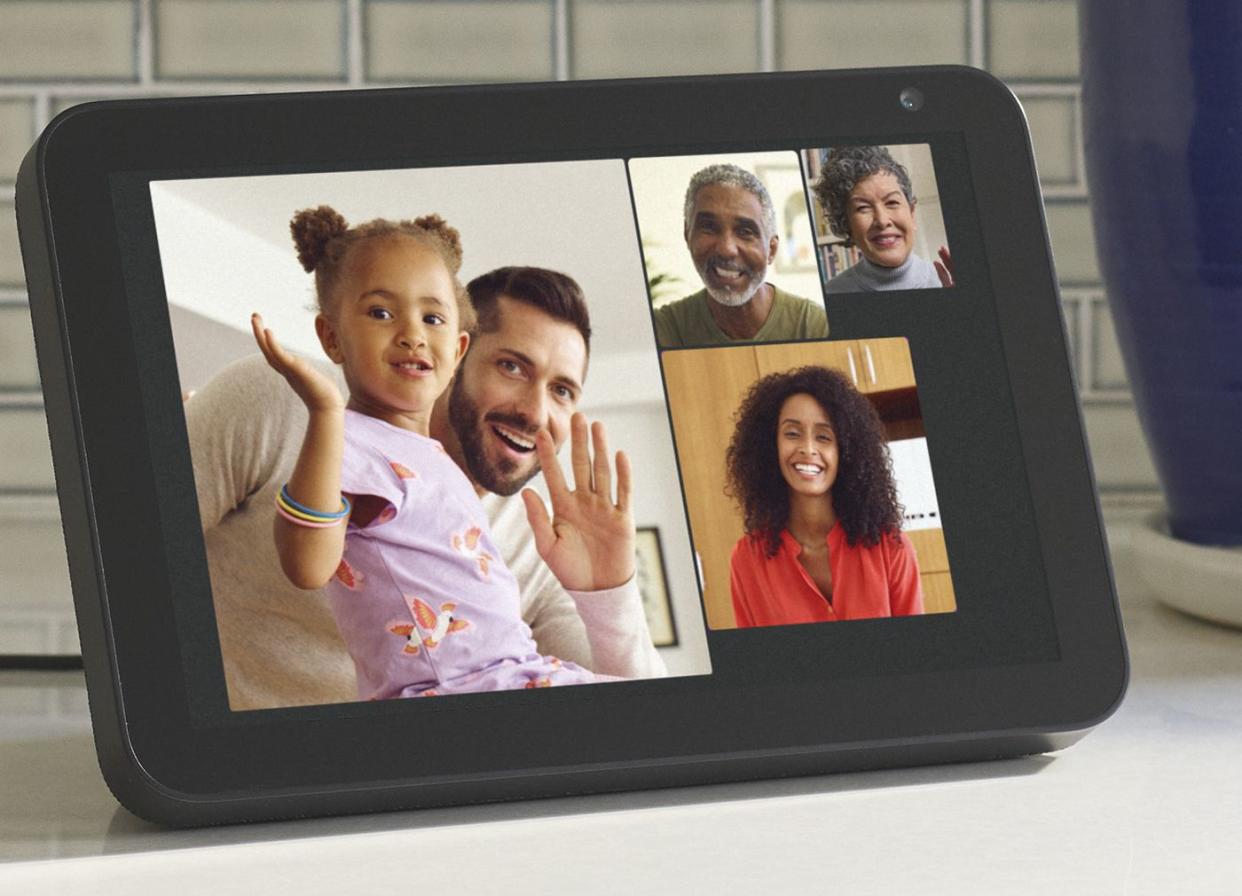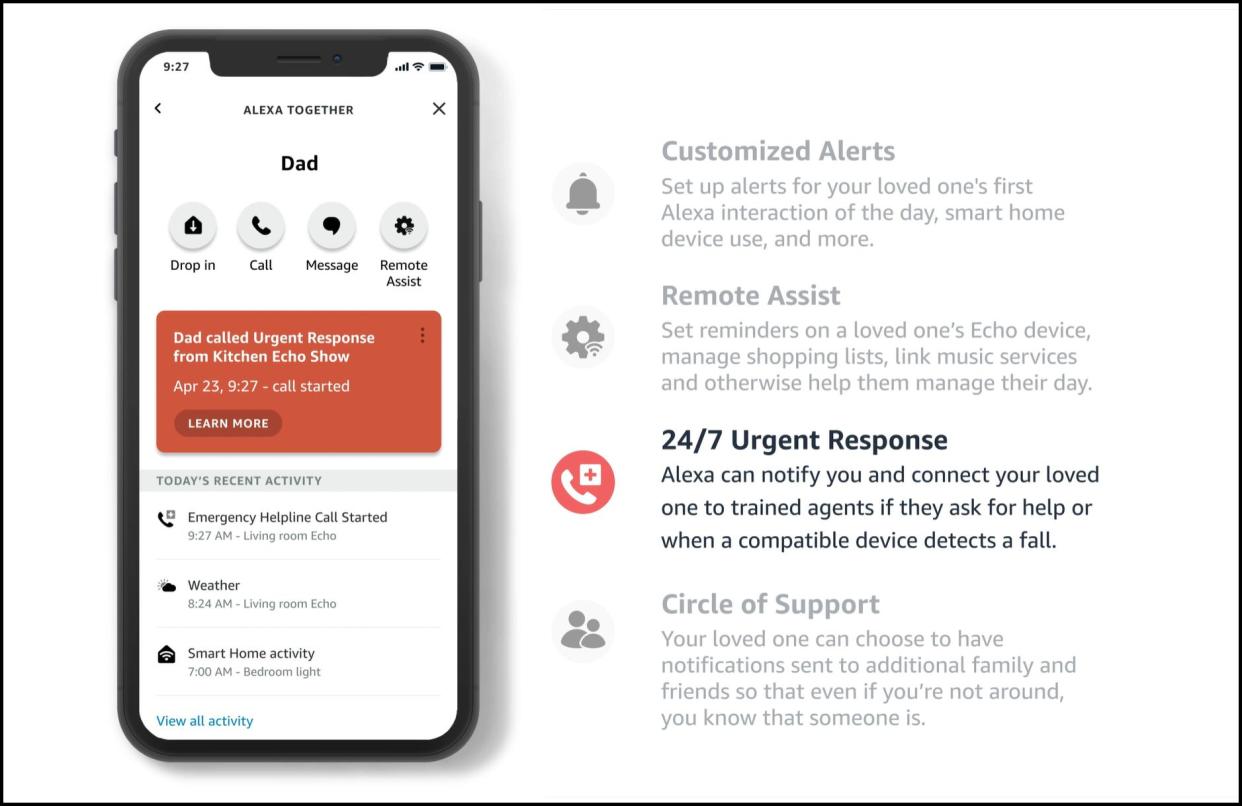#How to choose the best smart home speakers for seniors

Table of Contents
Of course, with smart speakers being so popular worldwide, there are many to choose from. To help you choose the best smart speaker for your needs, we tasked our research team with testing and researching the leaders of the pack to see what makes them so great. We analyzed each speaker based on cost, ease of setup and use, the number of options and capabilities built-in to the speakers, as well as compatibility with other gadgets you may own with voice assistants. Below we outline the top three smart speakers for seniors based on a range of needs to help you find the right smart speaker that suits your lifestyle. These speakers offer great sound and functionality whether you’re streaming music or calling loved ones.
Key Considerations
Before we dive into our top smart speaker picks, you should know a few basic things about these handy helpers.
What is a smart speaker?
A smart speaker is a device that combines a traditional speaker – plays music, podcasts, audiobooks and more – with the capability to respond to your voice commands to do everything from tell you the news and weather, turn on and off compatible lights, and even adjust the thermostat. Something that is especially great for seniors is the smart speaker’s ability to make audio and video calls to family and friends via bluetooth or Wi-Fi and even make an emergency call to 911 just by giving it a voice command. All it takes to make this sort of virtual assistant come to life is a connection to your home’s Wifi.
What can a smart speaker do?
Smart Speakers are designed to be an all-in-one virtual assistant with a simple command that starts with “Alexa” “Ok Google” or “Hey Siri”, From there, you ask it to either tell you something, do something, or even remind you of something later in the day or next month. A few of the most commonly used features of a smart speaker include”
-
Play music
-
Create a shopping list
-
Remind you to take medicine or to keep an appointment
-
Adjust lighting (on/off, dim)
-
Turn the TV on/off
-
Make emergency calls
-
News briefings
-
Weather reports
-
Kitchen timers
-
Medication reminders
-
Music and live-streaming radio stations
-
Podcasts and audiobooks
-
Voice (or video) calls to friends and family members
Truly, the list is almost endless, especially when you factor in the endless apps that can automatically be installed via voice command. If you’re in the kitchen, you can ask for measurements (“how many cups in a pint?”) and recipe help (“How do I know if my baking soda is still good?”). If you have other smart-home devices like smart plugs or a smart TV, you can use voice control to turn off a light or say, “play Grace and Frankie on Netflix,” and the TV will turn on, go right to Netflix and start playing the program.
In some cases, you can also purchase a remote caregiving service that integrates with the speaker, an added security measure for those who live alone or have health concerns.
Are smart speakers a privacy concern?
This question comes up a lot due to the nature of smart-speaker technology: By design, their microphones are always on, always listening. Not everyone is comfortable with that, which is understandable. However, keep in mind that smart speakers don’t actually do anything unless you’ve first invoked it to wake up the smart assistants by saying: “Alexa,” “Hey, Google” or “Siri.”
OK, but what happens then? Are your commands recorded and saved? Processed by humans? Used to uncover your deep, dark secrets? Is the government coming?! These are (mostly) legitimate concerns, but allow me to put your mind at ease: While Amazon, Apple and Google have slightly different policies when it comes to smart-speaker data collection and usage, they’re just businesses. They want to improve how the products perform and predominantly use any data stored to do such. But marketing isn’t inherently nefarious, and in most cases, you can delete any recordings stored by your speaker.
Using one is, of course, a personal decision, but I think the benefits vastly outweigh any privacy risks. I’ve owned smart speakers for nearly a decade; and have yet to feel my privacy was compromised.
How we picked the best smart home speakers
Many of these speakers, or at least the technology, have been around for a long time. That said, the core capabilities haven’t changed much: You ask a question or issue a command and the speaker responds. Most of the tweaks have been physical — different shapes and colors — and under the hood, with improvements to speaker quality and microphone sensitivity. Of course, the virtual assistants — Alexa, Google, Siri — have grown better, or “smarter,” with time as well.

The result is that most modern smart speakers are varying degrees of very good, which begs the question: What makes one better than another? Sound quality is a factor, of course, and that might be important for anyone who enjoys listening to music. You can definitely tell the sound quality difference between, say, the Apple HomePod and the Amazon Echo Dot. (The former sounds great; the latter, good.) But when it comes to capability and connectivity, that’s when the features and what sets each speaker apart, becomes much more defined. Thus, in doing our research, we looked not just at price, design and sound quality, but also:
-
Ease of setup
-
Ease of calling family members and/or emergency services
-
Integration with other smart-home devices
-
Integration with safety devices
-
Senior-specific capabilities
-
Video call capabilities
Now, let’s look at the top three smart speakers available today and break each down so you can get a clear picture of the capabilities and decide which is going to be the best fit for you.
Alexa speakers for seniors
Cost: $40 for the basic Echo Dot up to $260 for Echo Show with video and streaming
Extras: Alexa Together $20 a month of senior-specific apps and support
Works With: Smartphones, TVs, Lights, Thermostats and more
The Echo Dot has a list price of $50 but routinely goes on sale for $30-40, so be sure to keep your eyes peeled for deals on Amazon.
Alexa isn’t always the smartest assistant in the room (Google earns that crown, more on that later), but on the whole, it’s a true standout in its field. Amazon leads the pack in terms of “skills,” many of which are integrations with third-party tools and services. For example, you can enable skills to ring your misplaced phone, play white noise at bedtime or challenge you to a trivia pursuit game.
Most importantly, there are plenty of skills specifically designed for seniors. If you take daily blood pressure readings, a skill called Alex Care can record them for you (through voice prompts) — and alert you if they’re are any anomalies. If you live in a senior community that works with the support service Caremerge, you can ask for things like daily announcements or whether the mail has been delivered.
Alexa-powered Echo devices can also make phone calls, either to numbers in your contact list (which can be imported into the Alexa app from your phone) or to any number you ask Alexa to dial. One exception: 911. But see below regarding the Alexa Together option, which adds support for emergency services.
Amazon’s Alexa Together is a remote-caregiving service designed to help family members stay in constant contact with loved ones, particularly those living on their own. For example, it can alert caregivers and family members of your first Alexa interaction of the day and deliver custom reminders at specific times (medication, doctor’s appointments, social appointments). But the real win here is 24/7 Urgent Response, which affords hands-free access to emergency services. (In the event of, say, a fall or chest pains, just say, “Alexa, I need help.”) Activating that part of the service also sends immediate notifications to participating family members.
Alexa Together can also integrate with various fall-detection devices, such as the SkyAngelCare Pendant. In the event of a fall, Alexa will ask the wearer if he or she is okay, then engage “Urgent Response” if needed.
The service costs $20 monthly; there’s currently a 30-day free trial available. Worth noting: Amazon also offers an array of Alexa-based accessibility features for those who struggle with hearing, vision, mobility and so on.
All this adds up to what we consider the best virtual assistant for seniors, especially considering the wide array of products available — some starting at just $40.
Google Assistant for seniors
Cost: Google Home Mini is $45; Google Nest is $80 upwards to $200 for a Google Hub Max
Extras: Google Support Calls (free)
Works With: Android Phones
A sharp design, this smart home touchscreen display with Google Assistant can live on your countertop and help you navigate life.
If you own an Android phone, you’re probably already well-acquainted with Google Assistant, who also lives inside Google’s Nest Audio and Mini smart speakers. That kind of continuity can be nice; the same is true for Siri-using iPhone owners (see below). However, Google Assistant doesn’t offer the same breadth of skills as Alexa, though it does work with a similarly wide assortment of smart-home devices. What’s more, I think Google’s gal does a better job with general-information inquiries — because, well, Google.
It’s too bad, then, that the search giant doesn’t cater to seniors in any meaningful way. Although you can set reminders and the like, there’s no integration with caregiver services, fall-detection devices or the like.
As for voice calls, the Nest Audio and Mini support it either with or without your smartphone getting involved, but there’s some complexity behind it. For example, if you activate what’s called “Google-supported calling,” you can make audio calls — but only to people in your Google Contacts list. You can’t dial, say, a pharmacy unless you first add that number to the list. You also can’t make emergency calls. Another option is carrier calling, which brings your phone into the mix and lets you call any number. However, this works only if Google Fi is your carrier, and emergency services still aren’t supported.
Siri for seniors
Cost: Apple Home Pod Mini is $99; Apple Home Pod $299
Extras: Products compatible with Apple’s “Homekit”
Works With: Apple products (iPhone, tablets)
With 5 color options, this HomePod mini is a small addition to your home that can make a big change.
If you own an iPhone, you’re probably well-acquainted with Siri, who also lives inside the Apple HomePod. Like other assistants, she can respond to a wide range of questions and requests, as well as turn voice commands into actions — turning off lights, adjusting the thermostat and so on. However, there’s a catch: These commands work only with smart-home products that support Apple’s HomeKit technology, and there’s a comparatively small number that do. For example, this popular Kasa Smart Plug 2-pack works with Alexa and Google Assistant but not HomeKit. That’s also true of the Wyze Cam v3 Indoor/Outdoor Camera and many other well-known devices.
Thus, if you’re hoping to make the HomePod into a hub for your smart home, you may be disappointed. It can be done, but you won’t have the same massive selection of compatible products to choose from.
Assuming you live within that ecosystem, however, you’re likely to find Siri a valuable companion. With your iPhone in close proximity, you can make hands-free phone calls and send text messages the same way. If you have multiple HomePod devices (including the HomePod Mini) around the home, they can function as intercoms.
But Siri herself doesn’t offer any real senior-specific advantages, like integration with a home-care service or a family check-in option. So, again, while she’s a solid choice for iPhone users, she’s not necessarily the best choice overall.
Final Thoughts
As I am sure you can tell, we definitely like Amazon Alexa devices the most when it comes to senior or empty-nester use. The compatibility, features, and extras like Alexa Together make it a far superior choice over other smart speaker brands that fall short in comparison, and the price tag is more than comparable to its direct competitors.
If you liked the article, do not forget to share it with your friends. Follow us on Google News too, click on the star and choose us from your favorites.
For forums sites go to Forum.BuradaBiliyorum.Com
If you want to read more News articles, you can visit our News category.






